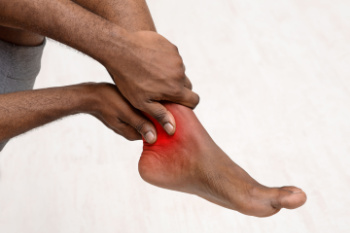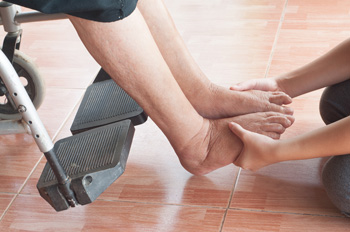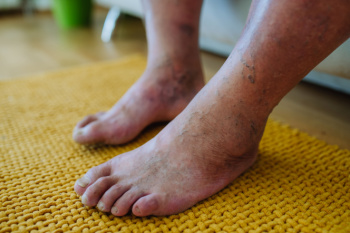Connect With Us
Blog
Items filtered by date: October 2024
Osteoarthritis of the Ankle

Osteoarthritis of the ankle is less common than in the knees or hips, but it can significantly affect quality of life. It often develops after injury, such as a fracture or sprain, leading to wear and tear of the cartilage. The average age of onset is typically in the 50s, but earlier cases may occur after trauma. Symptoms include pain, stiffness, and swelling, making it difficult to walk or stand for long periods of time. Initial treatments focus on relieving symptoms with conservative measures like targeted stretching exercises and supportive footwear. If pain persists, more advanced options include cortisone injections and orthotics. In severe cases, surgery may be necessary, ranging from joint-preserving procedures like arthroscopy or osteotomy to joint-sacrificing options like ankle fusion or total ankle replacement to restore mobility and reduce pain. If you suffer from ankle arthritis, it is suggested that you schedule an appointment with a podiatrist for an evaluation and treatment for the level of pain you are experiencing.
Arthritis can be a difficult condition to live with. If you are seeking treatment, contact Edward Orman, DPM from Honeygo Podiatry. Our doctor can provide the care you need to keep you pain-free and on your feet.
Arthritic Foot Care
Arthritis is a joint disorder that involves the inflammation of different joints in your body, such as those in your feet. Arthritis is often caused by a degenerative joint disease and causes mild to severe pain in all affected areas. In addition to this, swelling and stiffness in the affected joints can also be a common symptom of arthritis.
In many cases, wearing ill-fitting shoes can worsen the effects and pain of arthritis. Wearing shoes that have a lower heel and extra room can help your feet feel more comfortable. In cases of rheumatoid arthritis, the arch in your foot may become problematic. Buying shoes with proper arch support that contour to your feet can help immensely.
Alleviating Arthritic Pain
- Exercises that stretch the foot can prevent further pain and injury and increase mobility
- Most of the pain can be alleviated with anti-inflammatory drugs, heat, and topical medications
- Massages can help temporarily alleviate pain.
It is best to see your doctor for the treatment that is right for your needs and symptoms. Conditions vary, and a podiatrist can help you determine the right method of care for your feet.
If you have any questions, please feel free to contact our offices located in Perry Hall, and Fallston, MD . We offer the newest diagnostic tools and technology to treat your foot and ankle needs.
Diagnosis and Treatment of Foot Fractures

Foot fractures can occur from trauma, overuse, or accidents, and proper diagnosis is imperative for effective treatment. Symptoms include swelling, bruising, difficulty bearing weight, and intense pain. A podiatrist will diagnose a foot fracture through a physical exam and imaging tests to determine the extent and type of fracture. Treatment depends on the severity and location of the fracture. Minor fractures may heal with rest, in addition to wearing a protective boot or cast. More severe fractures may require immobilization with a cast or even surgery to realign the bones. Timely diagnosis and appropriate treatment are essential to ensure proper healing, prevent complications, and restore mobility. If you have sustained a foot fracture, it is suggested that you schedule an appointment with a podiatrist for appropriate treatment methods.
A broken foot requires immediate medical attention and treatment. If you need your feet checked, contact Edward Orman, DPM from Honeygo Podiatry. Our doctor can provide the care you need to keep you pain-free and on your feet.
Broken Foot Causes, Symptoms, and Treatment
A broken foot is caused by one of the bones in the foot typically breaking when bended, crushed, or stretched beyond its natural capabilities. Usually the location of the fracture indicates how the break occurred, whether it was through an object, fall, or any other type of injury.
Common Symptoms of Broken Feet:
- Bruising
- Pain
- Redness
- Swelling
- Blue in color
- Numbness
- Cold
- Misshapen
- Cuts
- Deformities
Those that suspect they have a broken foot shoot seek urgent medical attention where a medical professional could diagnose the severity.
Treatment for broken bones varies depending on the cause, severity and location. Some will require the use of splints, casts or crutches while others could even involve surgery to repair the broken bones. Personal care includes the use of ice and keeping the foot stabilized and elevated.
If you have any questions please feel free to contact our offices located in Perry Hall, and Fallston, MD . We offer the newest diagnostic and treatment technologies for all your foot and ankle needs.
Wounds That Don't Heal Need to Be Checked
Foot Exams for the Elderly

Routine foot examinations are essential for the elderly, as they are more prone to foot problems that can affect mobility and overall well-being. In aging populations, issues such as poor circulation, nerve damage, and thinning skin increase the risk of ulcers, infections, and deformities like bunions and hammertoes. Regular assessments help identify early signs of conditions such as diabetic neuropathy, arthritis, or fungal infections. During the exam, a podiatrist will check for changes in skin color, texture, and temperature, as well as assess the nails and overall foot structure. They will also examine pressure points, sores, or swelling, which may indicate underlying health problems. By detecting issues early, appropriate treatments can be provided, improving comfort and preventing further complications that could limit mobility and independence. If you are elderly or taking care of an older person, it is suggested that you schedule an appointment with a podiatrist to set up routine foot exams.
If you need your feet checked, contact Edward Orman, DPM of Honeygo Podiatry. Our doctor will attend to all of your foot and ankle needs and provide you with quality treatment.
Geriatrics and Podiatry
When people age, some common issues that may occur are bone density loss, dry skin, poor circulation, and rough brittle nails. These issues may also affect your foot health if the necessary steps are not taken to alleviate the problems.
It is important to take care of your feet because feet that are injured or diseased can affect your overall health. Having painful feet hinders your ability to do daily activities or may decrease your willingness to do the things that you need to do.
Visiting Your Geriatrician
As we age, health problems become more likely, so it is essential to visit your doctor for check-ups to ensure that you are doing the best you can to take care of your health. It is recommended to check your feet frequently for any possible cuts, bruises, swelling, corns or any other irregularities.
Taking Care of Elderly Feet
Cracked or dry feet can be treated by applying moisturizer often. It is also important not to wear old socks because the older the sock is, the higher the possibility there will be that there is bacteria there. Wear fresh socks and make sure they fit properly.
Proper foot health means that you can have a more active lifestyle and you will not be bogged down by pain. Foot health also leads to good circulation, which is paramount for overall health.
If you have any questions, please feel free to contact our offices located in Perry Hall, and Fallston, MD . We offer the newest diagnostic tools and technology to treat your foot and ankle needs.
How Diabetes Can Affect the Feet

Diabetes can have serious effects on the feet due to poor circulation and nerve damage, known as diabetic neuropathy. Reduced blood flow to the feet can delay the healing of cuts, blisters, or sores, increasing the risk of infections and, in severe cases, leading to ulcers or even amputation. Neuropathy can cause a loss of sensation in the feet, making it harder to detect injuries or changes in skin condition, which can go unnoticed and worsen over time. A podiatrist plays a critical role in diabetic foot care. They can perform regular foot exams to identify problems early, treat wounds, and recommend proper footwear or custom orthotics to prevent pressure points. Podiatrists also offer guidance on daily foot care routines, such as inspecting feet for sores and maintaining good hygiene. If you have diabetes, it is strongly suggested that you schedule routine podiatric visits to help manage diabetes-related foot complications and reduce the risk of serious issues.
Diabetic foot care is important in preventing foot ailments such as ulcers. If you are suffering from diabetes or have any other concerns about your feet, contact Edward Orman, DPM from Honeygo Podiatry. Our doctor can provide the care you need to keep you pain-free and on your feet.
Diabetic Foot Care
Diabetes affects millions of people every year. The condition can damage blood vessels in many parts of the body, especially the feet. Because of this, taking care of your feet is essential if you have diabetes, and having a podiatrist help monitor your foot health is highly recommended.
The Importance of Caring for Your Feet
- Routinely inspect your feet for bruises or sores.
- Wear socks that fit your feet comfortably.
- Wear comfortable shoes that provide adequate support.
Patients with diabetes should have their doctor monitor their blood levels, as blood sugar levels play such a huge role in diabetic care. Monitoring these levels on a regular basis is highly advised.
It is always best to inform your healthcare professional of any concerns you may have regarding your feet, especially for diabetic patients. Early treatment and routine foot examinations are keys to maintaining proper health, especially because severe complications can arise if proper treatment is not applied.
If you have any questions please feel free to contact our offices located in Perry Hall, and Fallston, MD . We offer the newest diagnostic and treatment technologies for all your foot and ankle needs.
Foot Pain From Standing All Day at Work

Foot pain from standing at work all day is a common issue, especially for those in jobs requiring prolonged periods of standing or walking. This discomfort is often caused by pressure on the feet, leading to conditions like plantar fasciitis, heel spurs, or arch strain. Wearing unsupportive shoes or standing on hard surfaces can worsen the problem, leading to foot fatigue, swelling, and even long-term damage. Symptoms may include aching, burning, or sharp pain in the arches, heels, or balls of the feet. Over time, the pain can spread to the ankles, knees, or lower back. To manage foot pain, it is important to wear supportive footwear with proper arch support and cushioning. If you have foot pain for any reason, it is suggested that you consult a podiatrist for a tailored treatment plan.
While working on the feet, it is important to take the proper care of them. For more information about working on your feet, contact Edward Orman, DPM from Honeygo Podiatry. Our doctor will treat your foot and ankle needs.
Working on Your Feet
Standing on your feet for long periods of time can cause stress and pain in your feet. Your whole body may experience change in terms of posture, back pain, bunions, callouses and or plantar warts. There are ways to avoid these conditions with proper foot care, smart choices and correct posture.
Positive Changes
Negative heeled shoe – Choosing this shoe type places the heel slightly lower than the ball of the foot. These are great for overall foot health. Find shoes that fit you correctly.
Go barefoot – Our feet were not designed to be enclosed for all hours of the day. Try to periodically expose your feet to air.
Eliminate Pain
Foot Exercises – Performing simple exercises, incorporating yoga and doing stretches are beneficial. This will allow increased blood flow to the area and muscles of the foot.
Achilles tendon – Stretching the foot out flat on the floor will relax the calf muscles and tendon. These exercises can be performed almost anywhere. Make sure you add these exercises to your daily regimen.
With a little bit of this information and knowing more about foot health, you will notice changes. Foot stretches and proper footwear will help with pain and prevent further issues.
If you have any questions please feel free to contact our offices located in Perry Hall, and Fallston, MD . We offer the newest diagnostic and treatment technologies for all your foot and ankle needs.
Blog Archives
- March 2025
- February 2025
- January 2025
- December 2024
- November 2024
- October 2024
- September 2024
- August 2024
- July 2024
- June 2024
- May 2024
- April 2024
- March 2024
- February 2024
- January 2024
- December 2023
- November 2023
- October 2023
- September 2023
- August 2023
- July 2023
- June 2023
- May 2023
- April 2023
- March 2023
- February 2023
- January 2023
- December 2022

